Episodes
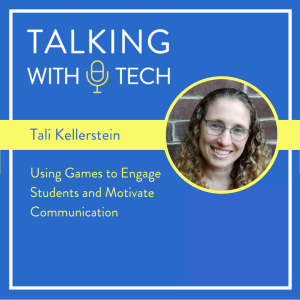
Wednesday Mar 02, 2022
Wednesday Mar 02, 2022
This week, Chris interviews Tali Kellerstein, an SLP and owner of The Speech Boutique (https://thespeakboutique.com/) who recently presented at ASHA with Chris on incorporating games and communication! Tali shares about strategies she uses to incorporate games with literacy, letting the child’s targets drive what game you choose, and more!
Before the interview, Rachel shares about working with a client who uses AAC and how she got him motivated using games related to his specific interest, elevators. Chris shares some ideas for incorporating elevators into a home-made game and other ways we can hone in on someone’s interest in therapy!
Key ideas this week:
🔑 You can incorporate games and books together in therapy - if you know what words you want to target, you can choose a book that connects to that theme and a game that will help evoke your target. Manipulate both the story and book to get the child to communicate as much as possible.
🔑 When choosing what game you want to play in therapy, choose the game that will best targets the words you want to target. Avoid choosing a game simply because it matches a particular theme, holiday, or season.
🔑 Buying books and games for therapy does not need to be cost-prohibitive. if you find the right books and games to target particular words, you can those materials over and over again.
Help us develop new content and keep the podcast going strong! Support our podcast at patreon.com/talkingwithtech!
Visit talkingwithtech.org to access previous episodes, resources, and CEU credits that you can earn for listening to TWT episodes!
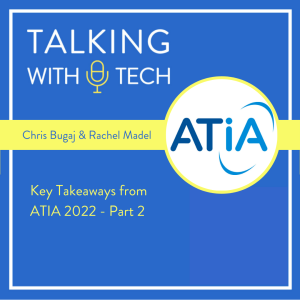
Thursday Feb 24, 2022
Thursday Feb 24, 2022
This week, we present part 2 of Rachel and Chris’s discussion of their experiences at ATIA 2022! This episode includes discussion of Rachel’s first experience with “AT Chat”; the benefits of learning in small groups during “Ed Camp”, the success of Chris’s “Cards Against Exclusivity” session, new strategies for using Canva in therapy, AT Maker Day, and more!
Links from this weeks episode:
Search #ATChat on Twitter
Ashley Larisey TWT Episode
Canva.com
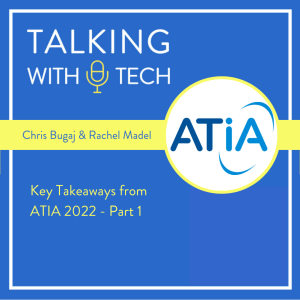
Thursday Feb 17, 2022
Thursday Feb 17, 2022
This week, Chris and Rachel discuss their recent trip to ATIA 2022 and some of their favorite takeaways. Rachel shares about being a ATIA first timer and how much she enjoyed learning from sessions with previous podcast guests Chris Klein, India Ochs, and Lance McLemore. Chris shares about his session learning about preparing people for transitioning out of school and into the workforce using the VOISS virtual reality app, as well as the tribute to Joy Zabala. Rachel and Chris also talk about a topic that got a lot of buzz at ATIA this year, “gestalt language processing”. For more on this topic, check out the TWT episode with Alexandria Zachos!
Links this week:
Alexandria Zachos: Supporting Spontaneous Speech in People Who Script https://www.talkingwithtech.org/episodes/alexandria-zachos
India Ochs Lawyer, Social Justice Advocate, Mother, and AAC User https://www.talkingwithtech.org/episodes/india-ochs
Chris Klein: Why Does Motor Planning Matter in AAC? https://www.talkingwithtech.org/episodes/chris-klein
Lance McLemore: Learning to Become a Proficient AAC User https://www.talkingwithtech.org/episodes/lance-mclemore
Voissadvisor.org
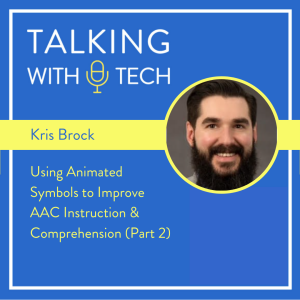
Wednesday Feb 09, 2022
Wednesday Feb 09, 2022
This week, we present part 2 of Chris’s interview with Dr. Kris Brock, an Assistant Professor at Idaho State University who shares his experience researching using animated AAC symbols to teach and represent verbs and prepositions.
Before the interview, Chris and Rachel share some of the resources that are being shared each week on the Talking with Tech Patreon page, including www.wombo.ai, mytalkingpet.com, biteable.com and more! If you are a TWT listener and would like to support the podcast while getting access to bonus resources and content each week, join our patreon at patreon.com/talkingwithtech!
Key ideas this week:
🔑 If you are searching for GIFs to teach verbs & prepositions, use caution in choosing GIFs that don’t move too fast and represent the concept you want to represent exactly.
🔑 Pairing the static symbol on an AAC user’s device with the animation they are watching can be more effective than trying to teach the meaning of the animation alone.
🔑 Pairing audio with animation can be a better choice than pairing text with animation because audio uses a different input modality. By using different channels, you can allow for more effective processing.
🔑 Studies have indicated that animated visual scene displays may help some AAC users (e.g. people with aphasia) to generate more complex communication than using a grid, which requires more internal processing to interpret.
Links this week:
www.wombo.ai
mytalkingpet.com
biteable.com
S. Berney, Mireille Bétrancourt (2016) Does Animation Enhance Learning? A Meta Analysis
Help us develop new content and keep the podcast going strong! Support our podcast at patreon.com/talkingwithtech!
Visit talkingwithtech.org to access previous episodes, resources, and CEU credits that you can earn for listening to TWT episodes!
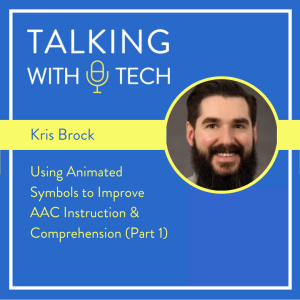
Wednesday Feb 02, 2022
Wednesday Feb 02, 2022
This week, Chris interviews Dr. Kris Brock, an Assistant Professor at Idaho State University, and President-Elect of Idaho Speech Hearing Association. Dr. Brock shares about his fascinating research into using animated AAC symbols for verbs and prepositions to improve symbol comprehension and reduce the time it takes to teach abstract words. Dr. Brock shares why using animations can be so powerful, why verbs and prepositions are the most important to animate, and why teaching verbs can happen naturally by simply showing the animations.
Before the interview, Chris and Rachel talk about animated GIFs and how they can be used in therapy. Rachel likes to use them to build literacy and to work on verbs in a way that is fun and motivating. Rachel finds GIFs with her client that the client loves, and they work on core words and literacy using that favorite character. Rachel shares about collections of GIFs for sale at her site at rachelmadel.com/shop
Note - be careful searching for GIFs in real time with kids, as some content on sites like giphy.com are not appropriate for them. Choosing GIFs ahead of time may be a better choice in some circumstances.
Key ideas this week:
🔑 Animated graphic line drawings are powerful tools, because they attract the kid’s attention, convey information about a process from beginning to end, and portray completion of a procedure.
🔑 Verbs and prepositions are the most important to animate, since they are more abstract and cannot be fully captured from beginning to end with only one static image.
🔑 If you target the verbs, you get the nouns for free. If you teach syntax and you teach verbs, then you don’t have to specifically target the nouns, that will happen naturally.
🔑 Dr. Brock’s research, which studied typically developing children, showed there was a 20 - 30% increase in successful interpretation of a 5 symbol sequence when the verb and preposition were animated.
Help us develop new content and keep the podcast going strong! Support our podcast at patreon.com/talkingwithtech!
Visit talkingwithtech.org to access previous episodes, resources, and CEU credits that you can earn for listening to TWT episodes!
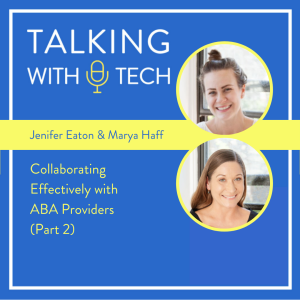
Wednesday Jan 26, 2022
Wednesday Jan 26, 2022
This week, we present Part 2 of Rachel’s interview Jenifer Eaton & Marya Hoff, two BCBAs who own Rooted in Play (rootedinplay.co), an Applied Behavior Analysis (ABA) practice in Orange County, California. This week, Rachel, Jenifer, and Marya discuss dealing with rigid ABA therapists, why Jenifer and Marya’s ABA practice is different than some older methods, their thoughts on anti-ABA sentiments from some Autistic adults, and more!
Before the interview, Chris and Rachel discuss the recent release of the Matrix Revolutions movie, and some of the things from the movie that reminded Chris of AAC implementation. This includes the idea that we don’t need to “ask permission” to pursue better practices around AAC, (e.g., providing robust language systems), in many cases we can start putting them into our own practice right away.
Key ideas this week:
🔑 Response effort - the harder something is, the more response effort it requires. The easier it is, the less response effort required. Once we have learned a skill, it takes less response effort. When teaching something new to a child, you want to minimize the response effort. If we put too much response effort into a task, the person won’t want to continue doing the task.
🔑 While there are rigid ABA practitioners out there, there is a newer, more naturalistic, and more collaborative approach for ABA. Under the old approach, there is less room for generalization and socialization. We aren’t teaching kids just to respond, we need them to be more spontaneous.
🔑 If you are dealing with a less collaborative BCBA who has a much different perspective on how to approach working with a student, you can always say “Lets do it your way for 2 weeks and then my way for 2 weeks and then look at the numbers.” You can also approach the parent for help - show them different approaches for ABA, they may not know the different approaches out there. BCBAs should be able to figure out how to make their program BA in nature while also accommodating the needs of speech and OT.
🔑 If you experience a BCBA engaging in unethical practices, you can report them to their governing board. Find out more at https://www.bacb.com/ethics-information/reporting-to-ethics-department/
Links this week:
Sign up for 7-day free trial from Vooks: www.vooks.com
Vooks on Apple App Store
Vooks on Google Play Store
Vooks Mentioned by Rachel & Chris:
Stop & Go - https://watch.vooks.com/videos/stop-and-go
Benji, the Bad Day, and Me: https://watch.vooks.com/videos/benji-the-bad-day-and-me
Rachel Dorsey Podcast: https://www.talkingwithtech.org/episodes/rachel-dorsey-2
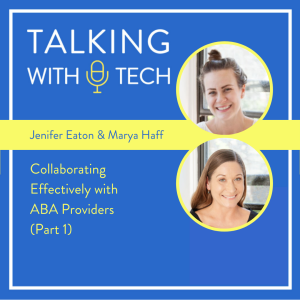
Wednesday Jan 19, 2022
Wednesday Jan 19, 2022
This week, Rachel interviews Jenifer Eaton & Marya Hoff, two BCBAs who own Rooted in Play, an Applied Behavior Analysis (ABA) practice in Orange County, California. Rachel shares about her experiences working with Jenifer and Marya to support one of her students, and why Rachel felt Jenifer and Marya were great examples of ABA and and SLP working together effectively to support language development and spontaneous utterance generation.
Before the interview, Chris and Rachel talk about their upcoming pre-conference at ATIA (find out more at) and some of the things that Chris is excited for at this year’s ATIA conference, including a discussion of the recent merger between Don Johnson, maker of Co-Writer, and Texthelp, maker if Read & Write. Learn more here.
Key ideas this week:
🔑 Rachel will often work with Behavior Interventionists who say “I’m just following the program I was given. I was told to target this in a specific way.” Rachel encourages these BIs to look at some less structured moments where there is not a program going that can be used for language development. Jenifer notes that BCBAs should ask their BIs to collaborate with the SLP as much as possible. This can help the BI feel more comfortable collaborating with the SLP.
🔑 In Jenifer and Marya’s opinion, the “least-to-most” hierarchy of prompting is compatible with ABA therapy. If we over prompt, the student will just wait for us to tell them what to say. You want to meet the learner where they are at - certain students may need more prompting at first - but you want to fade those prompts as soon as possible.
🔑 When you give kids more wait time and they are doing something engaging, often you will get lots of spontaneous and silly language without any prompting at all. You don’t have to require, demand, or expect a particular response. We can just be present.
Help us develop new content and keep the podcast going strong! Support our podcast at patreon.com/talkingwithtech!
Visit talkingwithtech.org to access previous episodes, resources, and CEU credits that you can earn for listening to TWT episodes!
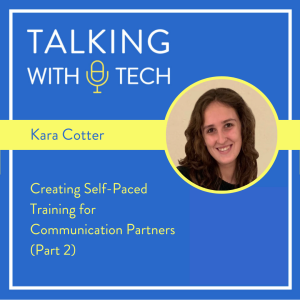
Wednesday Jan 12, 2022
Wednesday Jan 12, 2022
This week, we present Part 2 of Chris’s interview with Kara Cotter, a school-based AAC/AT Specialist who contacted Chris to ask about improving buy in, moving to the coaching model, making AAC more inclusive, and more!
Before the interview, Chris shares a Patreon subscriber’s questions about: 1) feeling “imposter syndrome” as a new AAC Specialist; 2) discussing the features of different AAC apps in a resource consideration meeting; and 3) how long to “trial” AAC systems to determine what system is best for the student.
Key ideas this week:
🔑 When you get a new AAC referral, you can provide a self-paced training module (e.g. google drive folder) and then jump into coaching with them after they have completed the initial training materials. This may help break up the coaching on your schedule, as some will finish faster than others.
🔑 How long should we trial AAC apps to determine best fit? There are a lot of factors- if we go through a good SETT based process and the team decides on a tool, it is probably a good choice long term. It is unclear about the benefit (other than for insurance paperwork) of trialing multiple different systems with the student, as we have little control over many variables, and the best software long term may not be what the student is able to learn the fastest in a couple of weeks.
🔑 During a resource consideration guide meeting, using an outside AAC feature “wheel” or chart can be very helpful. Call Scotland has a feature matching wheel that can give an overview of different AAC features. https://www.callscotland.org.uk/blog/updated-aac-ipad-app-wheel-available-now/ Angela Moorad also has a “Free and Affordable Symbol-Based AAC apps” resource that has lots of feature matching information. https://bit.ly/free-aac-apps-for-ios
Help us develop new content and keep the podcast going strong! Support our podcast at patreon.com/talkingwithtech!
Visit talkingwithtech.org to access previous episodes, resources, and CEU credits that you can earn for listening to TWT episodes!
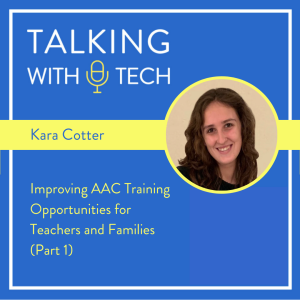
Thursday Jan 06, 2022
Thursday Jan 06, 2022
This week, Chris has a discussion with AT Specialist Kara Cotter! Kara asked Chris about her current efforts to get greater buy-in from teachers, ideas for moving to a coaching model in her district, and strategies for training teachers and students.
Before the interview, Chris and Rachel kick off the new year with a discussion a group they are thankful for in the new year - the Talking with Tech fans! The support of the community has been huge to helping our podcast continue! Chris also talks about a few specific fans who approached him at presentations and why he appreciated those interactions, and how he was recently reminded that not everyone is in the “AAC bubble” and knows what AAC is.
Key ideas this week:
🔑 When teachers and/or staff ask for help with AAC, consider providing them with a professional development experience (e.g. email with short videos explaining key concepts, how-to’s, etc) to empower them before getting involved.
🔑 If you have a folder on a shared drive with videos or documents for AAC training, try and make it as easy as possible to follow, e.g. have a “Read Me” file at the top with a guide on how to go through the training.
🔑 In some states, it is possible to submit teacher trainings for professional development credit - consider this as an option, if applicable, to help motivate teachers to attend the trainings.
Help us develop new content and keep the podcast going strong! Support our podcast at patreon.com/talkingwithtech!
Visit talkingwithtech.org to access previous episodes, resources, and CEU credits that you can earn for listening to TWT episodes!
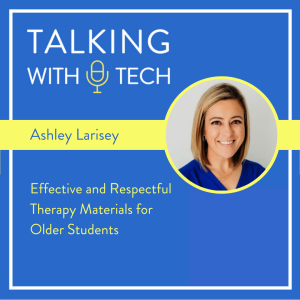
Thursday Dec 16, 2021
Thursday Dec 16, 2021
This week, Rachel interviews Ashley Larisey, a school-based SLP working in the high school setting and an adjunct faculty member at St. Xavier University. Ashley describes some of her strategies for motivating older students in therapy, why she prefers “age-respectful” instead of “age-appropriate” materials, considerations for older students who are just being introduced to AAC, and more!
Before the interview, Chris and Rachel chat about Rachel’s recent experience diving with sharks in Hawaii with One Ocean (oneoceandiving.com), as well as a fun discussion of 2021’s top episodes and why those episodes might be the most popular.
Key ideas this week:
🔑 it’s not too late to start AAC when a student is in high school. There is no age limit to starting AAC - we’ve never “missed the boat”. Let’s also make sure they have robust systems and are developing literacy.
🔑 Activities using sites like Canva that let you design an image can be very age-respectful. It has lots of stock pictures of teenagers. You can have students describe the pictures they like and help them create one big image with the pictures they chose embedded in it.
🔑 When choosing books with with repetitive lines, you are not going to read “Brown Bear, Brown Bear,” but you can make your own book on sites like Tarheelreader.org . You can embed more personal interests into the books to make them very personalized. We can make it respectful and also meaningful.
🔑 If you need to tell someone else that their materials are not age-respectful, you can do so in a more respectful way by asking questions like, “do you think he would respond better to materials with teens?” rather than something like “that’s not age-appropriate."
Help us develop new content and keep the podcast going strong! Support our podcast at patreon.com/talkingwithtech!
Visit talkingwithtech.org to access previous episodes, resources, and CEU credits that you can earn for listening to TWT episodes
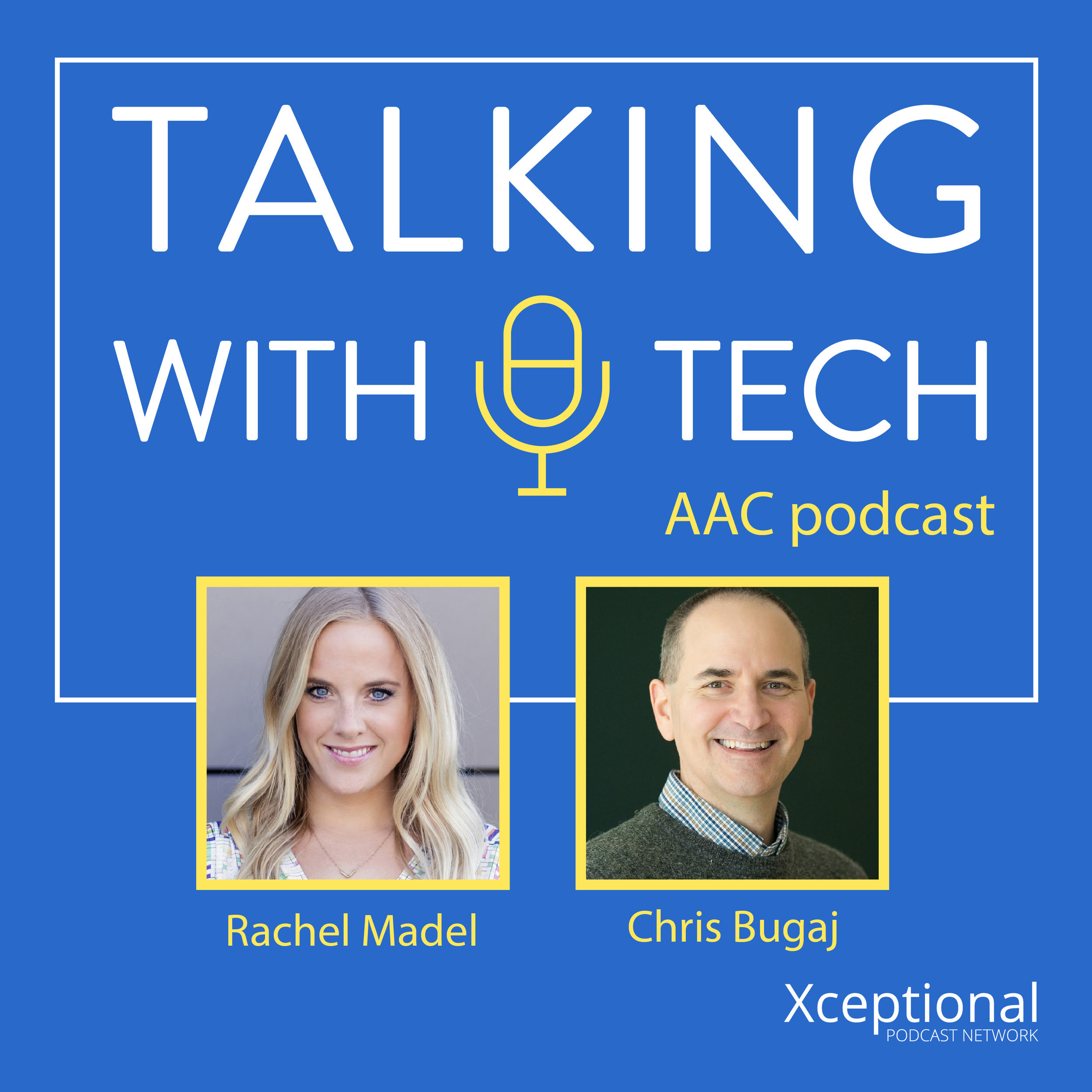
Join AAC experts Rachel Madel and Chris Bugaj as they dive into a weekly discussion about all things AAC (Augmentative and Alternative Communication). Every episode they deliver practical resources, clinical guidelines and relevant research to help clinicians better utilize technology for individuals with complex communication needs.
Episodes include interviews with industry thought-leaders, clinicians, parents, researchers and app developers to keep you on the pulse of the educational technology scene and better support communication through the use of technology.


